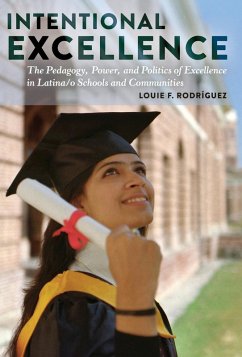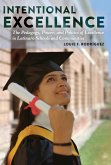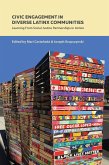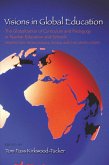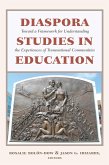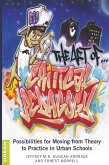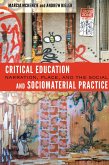Are we bold enough to recognize our own excellence in our schools and communities? This question drives Intentional Excellence, an audacious attempt at developing a Pedagogy of Excellence in Latina/o schools and communities as a result of observations, insights, and lessons learned from work with schools and communities across the United States. Louie F. Rodríguez argues that while there is no shortage of excellence in some of the schools and communities that struggle the most, there is a pedagogical void, or an Excellence Paradox, that has disallowed excellence from being used as a potential tool to transform the culture of education. This book offers an additive framework for committed stakeholders and outlines six key observations including the contagious nature of excellence, excellence as a responsibility, the political viability of excellence, the additive possibilities of excellence, the role of excellence as a curricular and pedagogical tool, and the role of excellence in working toward equity and social justice in education. Rodríguez discusses a series of case studies that have used Excellence Campaigns to organize, define, and recognize their own excellence. The book also discusses the possibilities of excellence beyond education and proposes a new role in education to make excellence happen: Excellence Engineers. The book concludes with a theory of action that is necessary for excellence to thrive in the twenty-first century. Our children and communities deserve to see themselves as «models of excellence» and this book proposes a pedagogy to help get us there.
Hinweis: Dieser Artikel kann nur an eine deutsche Lieferadresse ausgeliefert werden.
Dieser Download kann aus rechtlichen Gründen nur mit Rechnungsadresse in A, D ausgeliefert werden.
Hinweis: Dieser Artikel kann nur an eine deutsche Lieferadresse ausgeliefert werden.
«In this compelling new book, Louie F. Rodríguez shows us that rather than aiming for higher achievement (as measured by improvements in test scores), schools serving low-income students of color must aim for excellence. He does more than merely implore us to do this, he provides concrete examples to show how this is and can be done. For those who believe that education has the power to transform lives by igniting aspirations, expanding opportunities, and cultivating a love of learning, this book will be an invaluable resource» (Pedro A. Noguera, Peter L. Agnew Professor of Education and Executive Director, Metropolitan Center for Research on Equity and the Transformation of Schools, New York University)
«Louie F. Rodríguez provides asset-based narratives on achievement for Latin@ youth by offering a new and innovative lens on excellence for Latin@ school success. This practical framework for nurturing the development and enactment of excellence is very useful to K-12 educators who are desperately seeking to meet the academic and social needs of a variety of students of color.» (Dorinda Carter-Andrews, Associate Professor of Teacher Education, Michigan State University)
«This must-read book turns school failure on its head and provides a riveting testimony to the power of excellence in Latino communities and schools» (Gilberto Q. Conchas, Professor of Educational Policy and Social Context, University of California, Irvine; Author of The Color of Success)
«Given how often education reformers study what does not work, Louie F. Rodríguez provides tools and a roadmap to uplift excellence. In doing so, he is changing the narrative of achievement; shifting the paradigm from a deficit-orientation to a solution-based beacon. This important work will encourage communities to implement systemic change that is part of a larger movement for equity and social justice.» (Vajra Watson, Director of Research and Policy for Equity; Founder of Sacramento Area Youth Speaks (SAYS), University of California, Davis)
«The field of education has only known a handful of instances where a scholar is advocating for excellence in K-12 schools similar to ones he attended and sends his children to. As a nation - as a field - we have become complicit in the (mis)education of Latina/o students. Louie F. Rodríguez challenges us to curtail deficit thinking in our schools and reclaim our power in engineering approaches to make pedagogies of excellence for Latina/o children, indeed, intentional» (Rebeca Burciaga, Assistant Professor of Educational Leadership, San José State University)
«Louie F. Rodríguez provides asset-based narratives on achievement for Latin@ youth by offering a new and innovative lens on excellence for Latin@ school success. This practical framework for nurturing the development and enactment of excellence is very useful to K-12 educators who are desperately seeking to meet the academic and social needs of a variety of students of color.» (Dorinda Carter-Andrews, Associate Professor of Teacher Education, Michigan State University)
«This must-read book turns school failure on its head and provides a riveting testimony to the power of excellence in Latino communities and schools» (Gilberto Q. Conchas, Professor of Educational Policy and Social Context, University of California, Irvine; Author of The Color of Success)
«Given how often education reformers study what does not work, Louie F. Rodríguez provides tools and a roadmap to uplift excellence. In doing so, he is changing the narrative of achievement; shifting the paradigm from a deficit-orientation to a solution-based beacon. This important work will encourage communities to implement systemic change that is part of a larger movement for equity and social justice.» (Vajra Watson, Director of Research and Policy for Equity; Founder of Sacramento Area Youth Speaks (SAYS), University of California, Davis)
«The field of education has only known a handful of instances where a scholar is advocating for excellence in K-12 schools similar to ones he attended and sends his children to. As a nation - as a field - we have become complicit in the (mis)education of Latina/o students. Louie F. Rodríguez challenges us to curtail deficit thinking in our schools and reclaim our power in engineering approaches to make pedagogies of excellence for Latina/o children, indeed, intentional» (Rebeca Burciaga, Assistant Professor of Educational Leadership, San José State University)

